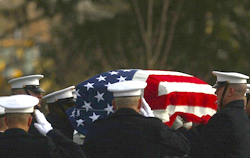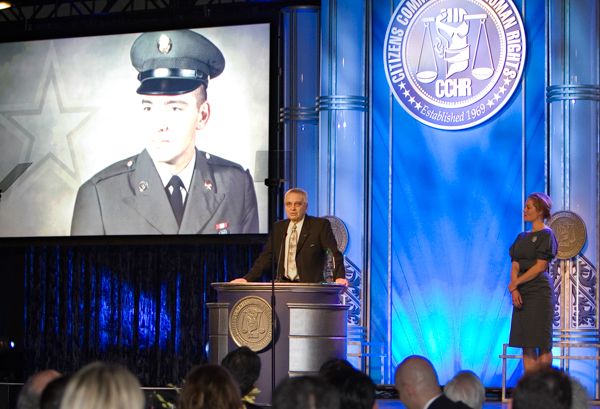CNSNews.com – September 4, 2014
By Barbara Hollingsworth
Dr. Bart Billings, a retired Army psychologist who has treated thousands of veterans suffering from post-traumatic stress disorder (PTSD), maintains that there is “a direct correlation” between the increased use of psychiatric medications to treat PTSD and the high rate of military suicides.
A surge of prescriptions since 2005 “coincides with the gradual increase, to this day, of suicides in the military. I feel there’s a direct relationship,” Billings told CNSNews.com, adding that the side effects of medications often prescribed by military psychiatrists include an increased risk for suicide.
“If you take a look at people who commit suicide, most of those people – I would say as much as 80 percent – are on some type of psychiatric medication where there’s a black box warning that indicates caution for suicidality, poor judgment and reasoning, anger and hostility, which can translate to homicide, depression, etc.,” he said.
Billings, who developed the military-wide Human Assistance Rapid Response Team (HARRT) program for troops following the Persian Gulf War, added that the danger of suicide is compounded for combat veterans who have suffered traumatic brain injuries.
‘When somebody has a traumatic brain injury, just the injury itself puts a person in a situation where the likelihood of them committing suicide is four times more than the population who has never been exposed to CTE (chronic traumatic encephalopathy) or a traumatic brain injury. So you’re four times more likely to commit suicide just by the fact that you’ve had some type of brain injury,” he said.
“And the big problem is those people wind up getting referred because of their symptoms – their anxiety, their depression, their forgetting things, their frustration. These are all physiological. They get referred to a psychiatrist. A psychiatrist isn’t a specialist in working with brain injuries. Psychiatrists should be nowhere near somebody with a brain injury.
“But the psychiatrist winds up giving them psychiatric meds, and my experience…since the 1970s, probably 90 percent of psychiatrists, if not more, prescribe psychiatric medications. That’s basically all they do. They don’t do therapy any more.
“So here you’re giving somebody that has the potential to kill himself four times more than the general population and now you’re giving them a medication which first black box warning is suicidality.”
“So you can take that four and multiply it by, who knows? Two, four, six, 10, 16, 18? And their chances of committing suicide are tremendously increased.”
Last year, 479 members of the military – 259 active duty personnel, 87 reservists, and 133 members of the National Guard – committed suicide. That figure was down from the record high of 522 reported in 2012, according to figures released last month by the Dept. of Defense.
 “Among full-time soldiers, the suicide rate soared to 29.7 deaths per 100,000 in 2012, well above a 25.1-per-100,000 rate for civilians of a similar age group during 2010,” USA Today reported.
“Among full-time soldiers, the suicide rate soared to 29.7 deaths per 100,000 in 2012, well above a 25.1-per-100,000 rate for civilians of a similar age group during 2010,” USA Today reported.
The Veterans Administration (VA) also reported that of the 147,763 suicides reported in 2012 in the 21 states that list veteran status on death certificates, 27,062 (22.2 percent) were veterans. The VA estimated that 22 veterans killed themselves each day.
In 2012, Assistant Secretary of Defense Jonathan Woodson, M.D. sent aletter to members of the Medical Command (MEDCOM) directing them to reduce the levels of anti-psychotic medication they were prescribing for PTSD.
“The greatest concern is the suspicion of the over-prescription of antipsychotic medications for PTSD,” Woodson stated, including Seroquel, a powerful anti-psychotic that was being prescribed off-label to soldiers for sleep disorders and irritability associated with PTSD.
“I remember one battalion commander telling me that when they flew from Iraq to Germany for a rest, a medic was walking down the aisle giving every soldier a Seroquel pill to help them sleep,” Billings told CNSNews.com. “That’s like playing Russian roulette. People respond differently, and you never know how it’s going to affect somebody.”
A 2011 study by the VA, published in the Journal of the American Medical Association, found that risperidone, another powerful anti-psychotic drug used to treat schizophrenic and bipolar patients, was no more effective in treating PTSD than a placebo.
“The use of such drugs has grown sharply over the past decade, as thousands of returning soldiers and Marines have found that their post-traumatic stress symptoms do not respond to anti-depressants, the only drugs backed by scientific evidence for the disorder,” The New York Timesreported.
Last year, a federal judge awarded $3.7 million to former Marine Stanley Laskowski, an Iraq War veteran from Carbondale, PA, who filed a medical malpractice against the VA for prescribing medication over the phone that did not adequately treat his PTSD, and never offered him an alternative treatment to overcome his symptoms.
“Now that the cat’s out of the bag, more and more people will take on the government,” predicted Billings, who submitted testimony to the House Veterans Affairs Committee on the link between psychiatric medication and veteran suicide on Feb. 24, 2010.
 “I told them there was a direct correlation between the increases of psychiatric meds in the military and the suicide rate,” he told CNSNews.com.
“I told them there was a direct correlation between the increases of psychiatric meds in the military and the suicide rate,” he told CNSNews.com.
Billings said that many years of clinical observation convinced him that brain-altering medication was not the best way to treat PTSD.
“I’ve been in the mental health field for 47 years and I never once prescribed a psychiatric medication. Not once. And I had access – I worked at state hospitals, mental health clinics, and I could have easily recommended that people be medicated.
“But I found out very early in my career when I working at Mendocino State Hospital in California that when people were medicated, it was very, very difficult working with them.”
Billings organized the first National Tri-Service Combat Stress Conference at Camp Pendleton in 1993. The latest one was held in Carlsbad, California in May.
Watch Bart Billing’s Human Rights Award presentation from Citizens Commission on Human Rights:
“We came to the realization that integrative treatment is the treatment of choice for people who have been in combat. The medications that they’ve been giving our troops, both at the VA and in combat, are ineffective and cause what the black box warning states,” he told CNSNews.com.
“The various types of treatment modalities – which can consist of basic counseling, group therapy, hydrotherapy, biofeedback, guided imagery – are proven to be effective to get people back to functioning in our community at a fraction of the cost of medication,” Billings added. “Within months they are back living their normal lives and doing fine.”
That’s because, he maintains, PTSD is primarily a physiological response to combat conditions.
“Combat is an environment where there is a tremendous amount of high-intensity, low-frequency vibration on the battlefield, which causes vibroacoustic syndrome, which is cellular damage to the whole body whenever you feel sound,” he explained. “It was called ‘shell shock’ in World War I, and they had it right.
“What they were saying – and didn’t know it at the time- was vibroacoustic syndrome. Because they were constantly being hit by a tremendous amount of high-intensity, low-frequency vibrations. It damages every cell in your body. People get to a point where they can’t function.”
A new medical specialty – physical medicine & rehabilitation (PM&R) – was established in the late 1930’s to treat patients suffering from what was then know as shell shock or battle fatigue, Billings said.
“A PM&R physician is called a physiatrist. I wound up for several years at UC/Davis Medical School, and I was chief of Professional Services and assistant director for Physical Medicine and Rehabilitation at the teaching hospital. And we had probably one of the highest rated residency programs in physiatry in the country.
“We were doing biofeedback, acupuncture, integrative treatment. Today you hear people talk about integrative treatment. That’s nothing more than PM&R. They just changed the name,” he said, adding that even severe cases of PTSD can be successfully treated by PM&R without the use of psychiatric medications.
“That is the profession that should be working with our troops. I blame physiatry itself for not stepping forward and assuming the leadership in this area, and psychiatry for not making people aware of this profession and for not making referrals for people with traumatic brain injuries or various types of disabilities that they have no business working with.”
Billings was the recipient of the 2014 Human Rights Award by the Citizens Commission on Human Rights (CCHR), which has produced a documentary, “The Hidden Enemy,” on the use of use of psychiatric drugs in the military.
Watch The Hidden Enemy here:


